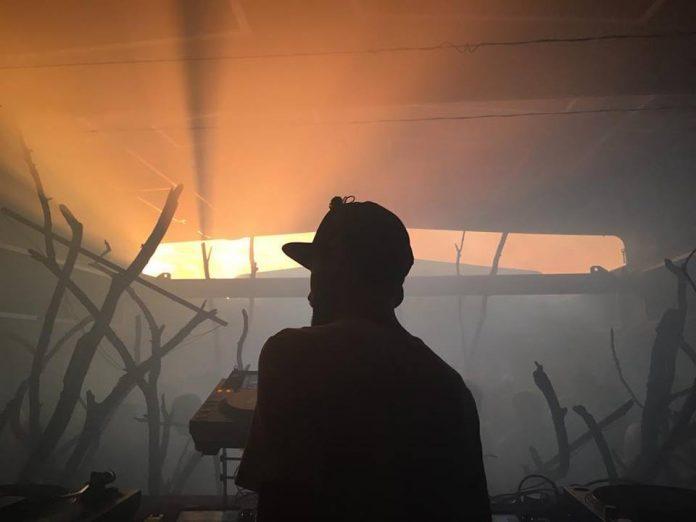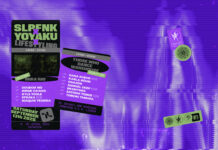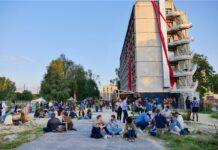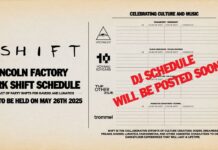Having swapped hip-hop for deep and minimal house Roger Gerressen has progressed to become one of the most in-demand artists in the burgeoning Yoyaku stable of artists as well as an accomplished label head in IRENIC. To get the full picture we sat down with the Dutchman to find out the whole story…
Talk to me a little bit about how you started out with music, I’ve heard your main introduction was through hip-hop in the 90s?
Yeah, that’s true. I grew up listening to hip-hop in the early 90s, I actually really disliked electronic music at first! It all started off after receiving A Tribe Called Quest album from one of my sister’s then boyfriends on my 13th birthday and I also used some of my birthday money to buy Wu-Tang’s first album as well.
I knew a little about ATCQ but I knew nothing about the Wu-Tang Clan except I was always attracted to their logo. They’re two pretty diverse and hardcore albums for a young kid to listen to and they were the only two albums I owned, so I was forced to listen to these on repeat for three weeks…life was never the same!
Is there anything you’ve taken musically or culturally from those days and hip-hop as a genre?
For sure, Q-Tip’s use and selection of sampling as well as his digging for obscure music and sounds sent me on my own path of discovery. This led me to listen to genres and artists I would have never found on my own. But, most importantly, it made me appreciate the warm sound of sampling, the crackles and pops, and it sparked my fascination for looped music. I always noticed the beats were the most important element to me and I always liked the sparse parts with the breakdowns.
Do you still listen to hip-hop/rap? If so, is it mainly old school or the new wave of artists? Do you take anything from the genre in its current form?
It’s what I listen to the most at home. I’m not really familiar with a lot of new hip-hop artists but every now and then some friends introduce me to cool artists that hit the spot soundwise and make me come back to listen more often.
People like Tyler the Creator and his crew, Quelle Chris and Kendrick Lamar. But I don’t really get inspired by it, even though I recognize they are doing some cool and interesting things sonically and conceptually. I also always keep an eye out for new Madlib stuff.
House music and especially the strand of house you play is not normally associated with the Netherlands. With hard techno and even gabber stealing the headlines for the past few decades, did you ever feel like your sound was an outlier?
No, I don’t really feel like my sound is an outlier, I’ve never really looked at it that way, to be honest. I do feel like that at times my character or persona is an outlier in the current Dutch scene though. Gabber and Trance did rule the Dutch airwaves in the 90s with a strong presence in the pop charts as well.
It actually really made me dislike electronic music as I mentioned earlier, thinking these styles were electronic music. It took a drug-related experience at a techno event and a few Steve Rachmad mix-compilations to get me convinced and subsequently hooked.
You originally hail from Nijmegen, what’s the nightlife culture like there?
Yup I’m from Nijmegen, a smaller city in the east of the Netherlands, and we were lucky to have a really thriving scene for underground music. This was mainly because of the infamous Doornroosje club that celebrated it’s 50th birthday not too long ago.
It really became a techno hotspot during the 90s and 2000s, hosting many artists like Daft Punk’s Dutch debut, Jeff Mills, Derrick May and Dave Clarke on an almost weekly basis. Sadly they had to move out of their legendary old location and into a modern building, but they still continue to provide current generations with a steady stream of interesting artists to listen and party to.
Besides Doornroosje, there are promoters like ‘The Tribe’ and ‘Drift’ as well as many more that put together a lot of cool events in nice venues. Whether it is a small likeminded get together for insiders or a bigger festival. So there’s lot’s of stuff going on in Nijmegen!
Who are some of your early DJing inspirations? Do you still take things from them to this day?
When we’re talking DJ inspirations the first guys I admired were Jeff Mills, Steve Rachmad, Dave Clarke. Later on, when I wanted a break from fast techno, I became interested in a lot of UK DJs like John Digweed, Lee Burridge and Craig Richards as well as German guys like Steve Bug, Michael Mayer and Sven Vath.
Not all of them are still doing the same things as they did when they appealed to me the most, but they’re all still amazing artists. If I had to pick one from these names that still inspires me it would be Jeff Mills because he’s an entity of his own and has always been doing his own thing on a completely different level.
After a few solid years of production and climbing the DJ ladder, you were signed up to the Yoyaku booking agency! How did this opportunity arise?
It arose from friendship, mutual respect and a little bit of luck. I met them when they booked me at one of their earlier parties in Strasbourg when the foundations for Yoyaku were just being made. I played at an event at Rex Club in Paris the day before and they impressed me by showing up for that event. They were really down to earth, kind to me and they were shooting some really professional last-minute promo videos for their own event the day after.
Fast forward a few years and we were just having a skype talk about some new promos they wanted to send me when I mentioned that my agency at the time had decided to call it quits and Yoyaku immediately jumped in and asked me to join. And here we are!
Have you managed to learn anything from guys such as Cabanne? How much day-to-day contact do you have with the crew?
Now Yoyaku’s own events are really taking shape and keep popping up more regularly we get the chance to hang out more and more. Some of the crew I see more often compared to others, but it really is a family already.
I’m the only Dutch guy in the mostly French crew, but I really feel at home and I think each artist brings a slightly different element to the table. I’ve been able to get to know most of the artists on Yoyaku’s roster back when Yoyaku itself hit the scene a few years back, but I already loved and played a lot of music by Maayan Nidam and Cabanne, two artists I am proud to call my colleagues.
You’ve released on the YY sub-labels Tartouffe, Joule and Aku. Did you go ahead and think ‘I’m going to create some tracks that suit Joule’s sound’ or did you happen to have tracks that fitted in with the musical aesthetic anyway?
The latter. When we selected the tracks for those releases I had not sent any new tracks to any labels for a while, so we had quite a few tracks to pick from. I believe we could bundle most tracks pretty easily. But I do work like that from time to time, like when I worked on my Monoaware project for Sushitech Records. It’s a label with a clear sound so you already know where to take a track, but I usually create music with an open mind, get some tracks done and select later.
Do you have a preference for DJing or producing?
If you would’ve asked me a few years back I would’ve said DJing, because it’s how it all started, it’s what I really wanted to become good at first, before even trying to lay down a beat. But now after many years of production, I’d definitely say I am a producer first. It’s what I do every day and releasing music is my real pay-off on an artistic level.
I saw you say in a previous interview that because of your many years spent warming up dancefloors in Nijmegen you take the same approach to mixes. Does this still hold true or is just for podcasts?
Yep, it still holds up. I always adjust to the timeslot I’m playing, the other artists I’m playing with and the overall feel of the night. Those first few years when I had a regular spot at Doornroosje I had to open for artists like Ame, Jeff Mills, Marcel Dettmann, Mr. G…so you had to take a different approach for each of those artists.
It made me comfortable to play all styles, playing from ambient to house and back to serious techno. That’s what attracted me to those UK artists like Digweed/Richards/Burridge, they borrowed from each genre and just mixed it into an original mix of styles that followed the energy of the night.
I saw you in London and it seemed like anything but a warm-up…You, of course, closed room two and it was a very high energy set. Do you find it easy to switch between chilled and ‘going for it’?
When I used to travel with records only there were a few moments where you realize you didn’t pack the right records, but now we have been playing digitally for years you can bring all sorts of music on your USB, so I don’t really get surprised anymore.
Let’s talk a little about your label, Irenic. The Discogs bio defines Irenic as ‘aiming or aimed at peace’, is this what you’re trying to do with your music?
Yeah IRENIC literally means ‘aiming or aimed at peace’, I stumbled upon the definition by coincidence and it really felt like the right name for the project.
In my personal life, I have always been interested in politics and in the last few years, I’ve also tried to be outspoken on social media as well. I’m always trying to provide some new insights or a funny way to look at things. Sadly the current social media climate is pretty toxic to me and for a while now I have decided to lay low since it often turns out to be pretty useless to spend your time arguing with people you don’t even know on a personal level.
I do admire artists and people in general that like to take a stance though, but when you’re creating house/techno it can be difficult to express yourself like that. Obviously, you can use spoken word to get your point across, but I’ve never liked my own voice and I haven’t found the right people to work with on a project like that. The only options left are the artwork you choose and the titles you pick for your projects. With Irenic I try to dedicate each release on the main label to a person that did something for the greater good, and I try not to pick the most obvious well-known subjects. The artwork will always reflect the subject of the EP as well.
Not too long ago I took the next step with a label night as well and I am happy to say the first IRENIC night (we had Steve Rachmad do a special Parallel 9 set and Steve O’Sullivan live) at the Rex Club in Paris was a great success. I’m really Looking forward to taking this concept to other clubs as well!
Summer is quickly approaching, what do fans of Roger Gerressen and Irenic have to look forward to?
The remix EP for my track Faithful was recently released, with Steve O’Sullivan producing under his Bluetrain alias on the A side and Yoyaku’s Varhat bringing the modular heat on the flip.
Also, a bunch of new stuff to be announced on IRENIC soon like a new EP by me for IRENIC005 and a few compilation EPs with a fine selection of new talent. A bunch of these releases are in the mix I provided to you guys. I have also been prepping some new stuff for Yoyaku to pick from and I have been working on new Sushitech material as well!
Now we are at it, I also have some hip-hop instrumentals coming up and a very cool group project with Ivano Tetelepta and U-Gene which will be announced soon, you’ll see us venturing into the realm of experimental funk and broken beats.
Roger Gerressen also recently joined the ranks of our podcast series and you can check it out below.
More info on Roger Gerressen
Facebook | SoundCloud | Resident Advisor










![Premiere: A2 – mrelss – Season of Reason [AMAM044]](https://trommelmusic.com/wp-content/uploads/2026/02/label_side_A-Alessio-Mereu-324x235.jpg)
![Premiere: 2 – Santon – Only a Test (Alain de Saracho Remix) [SDR012]](https://trommelmusic.com/wp-content/uploads/2026/02/Santon-Only-a-Test-EP-Artwork-Alain-de-Saracho-100x70.png)
![Free Download: Zombies in Miami – What Ya Doing [TFD128]](https://trommelmusic.com/wp-content/uploads/2026/02/photo_2026-02-12-10.38.24-e1770892750337-100x70.jpeg)
![Premiere: 1 – DAT (Italy) – Not My Plan [SENS001]](https://trommelmusic.com/wp-content/uploads/2026/02/IMG_9750-Sensazione-Stupenda-100x70.png)
![Premiere: B1 – Kolhida – Break And Escape (Cezar Lazãr Remix) [TTM003]](https://trommelmusic.com/wp-content/uploads/2026/02/IMG_2883-Aleksandr-Gocheleyshvili-100x70.png)
![Premiere: A1 – JJ Fortune – Design [LNS10]](https://trommelmusic.com/wp-content/uploads/2026/02/1188556-100x70.jpg)
![Premiere: A1 – Alexander Skancke – Saga Of Subvision [QRK015]](https://trommelmusic.com/wp-content/uploads/2026/02/photo_2026-02-03_17-31-24-100x70.jpg)

![Premiere: A1 – Light Blue File – JUNIOR [RCR002]](https://trommelmusic.com/wp-content/uploads/2026/02/RCR.002.FRONT_.LABEL-Will-Gilliland-100x70.png)
![Premiere: A2 – Lisovskyi – Just One Good Whiff [FIB004]](https://trommelmusic.com/wp-content/uploads/2026/02/B-100x70.png)